Can Cats Eat Raw Chicken? What Are The Risks?
30.03.2022.
Your domesticated cat's diet is most likely already high in cooked and processed chicken. Still, felines in the wild consume raw meat on a regular basis, which may have you wondering: Can cats eat raw chicken?
The answer is a little tricky. Whether you're considering feeding your pet a raw diet or simply want to give your cat a snack while you cook dinner, consulting with your veterinarian is the best way to keep your cat safe.
Can Cats Eat Raw Chicken?
Yes, cats can eat raw chicken, but doing so carries risks. It is not always recommended, according to our resident veterinarian.
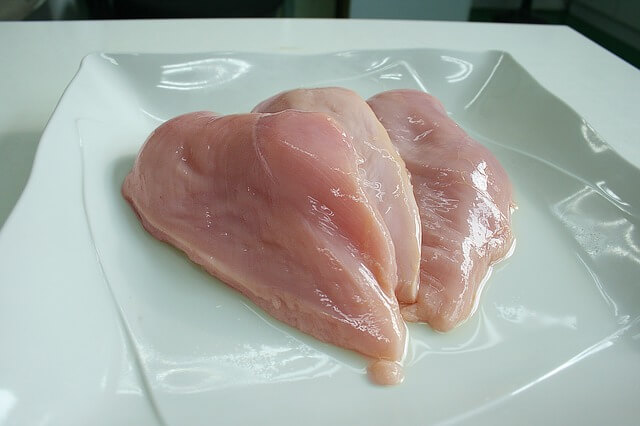
Cats are obligate carnivores, which means they must consume animal products in order to survive. They thrive on high-protein diets rich in meat-derived nutrients like fatty acids, taurine, and other essential vitamins. Supporters of a raw food diet for cats believe that replicating a wild cat's diet—which includes raw meat, bones, and organs—is ideal because cooking meat can alter vital nutrients.
RELATED: What Human Foods Can Cats Eat? List of 24 Safe Human Foods
However, in 2012, a statement was issued opposing raw food diets for cats. The statement was fully supported by the Association of American Feline Practitioners:
"Homemade raw food diets are unsafe because retail meats for human consumption can be contaminated with pathogens," the statement reads. "Many of the pathogens found in raw protein diets can be transmitted to the human population by contact with the food itself, pet, or environmental surfaces. A disturbing number of these organisms have also been shown to be resistant to multiple antimicrobials." - source
What is the most effective way to keep your cat safe? Before introducing any new foods to your cat's diet, especially raw meat, consult with your veterinarian.
What Are the Dangers of Feeding Raw Chicken to Cats?
Bacteria and parasites
While cats can digest raw meat better than humans, they are still susceptible to severe illnesses caused by harmful bacteria and parasites.
"Eating any type of raw meat poses potential safety concerns. Various bacteria, especially Salmonella and Campylobacter, as well as potential parasite exposure, all of which may cause severe GI distress and potential systemic illness. These problems can lead to dehydration, which is a serious concern," our veterinarian says.
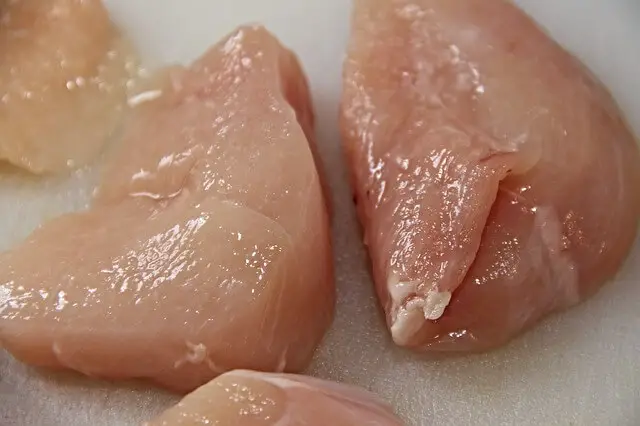
If your cat eats raw chicken and develops intestinal upset, contact your veterinarian immediately.
RELATED: Can Cats Eat Peanut Butter? What Do Vets Say?
Bones
Small pieces of bone can seriously harm your cat because raw chicken bones can become lodged in the esophagus, stomach, or intestinal tract and cause choking. Sharp bone fragments can pierce the intestinal tract in some cases, causing life-threatening sepsis.
Nutrient deficiency
Because raw chicken lacks a complete nutritional profile, it should not be fed as the sole food. Cats require a sufficient amount of taurine, which is essential for your feline's heart health. Veterinarian-recommended cat food is the most effective way to provide your cat with the nutrients they require for a healthy, balanced diet.
RELATED: Can Cats Eat Dog Food? What To Do If It Happens?
What Should I Do If My Cat Ate Raw Chicken?
If your cat ate raw chicken that was not adequately prepared, it is critical that you keep an eye on your cat and contact your veterinarian if you notice any of the following symptoms:
- Appetite loss
- Vomiting
- Diarrhea
- Lethargy
How to Prepare Raw Chicken for Cats in a Safe Way
If you're determined to feed your cat raw chicken (or any raw meat), consult with your veterinarian first. While wild cats eat raw meat, your domesticated cat is accustomed to processed, cooked food. If your veterinarian gives you the go-ahead to introduce raw chicken into your cat's diet, here are a few precautions to keep both you and your feline safe.
1. Check to see if the chicken is fresh
To begin, it is critical to buy fresh, raw chicken from reputable stores. Don't leave it too long before feeding this to your cat, as bacteria can grow as the chicken ages. Consider raw chicken marketed for pets, which is typically processed to add vital nutrients while reducing the risk of harmful bacteria.
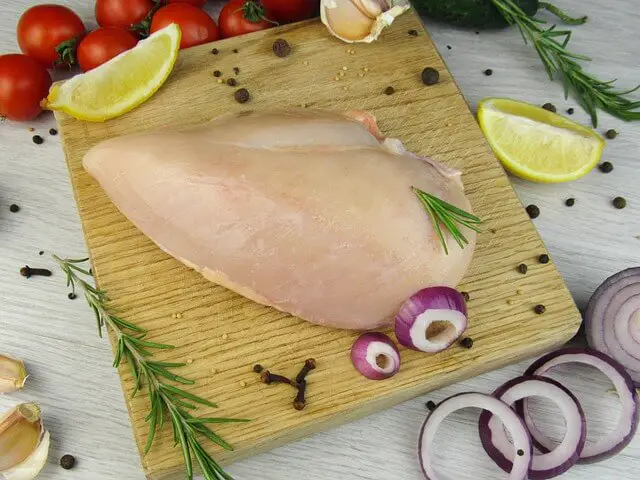
RELATED: Can You Give Bread to Your Cat? Is It Safe?
2. Carefully prepare the chicken before serving
When preparing the chicken, use a clean knife to cut the meat on a clean surface and remove any bones before serving. Give your cat only what they can eat in one sitting; any leftover meat must be discarded. After you've fed your cat, take out any leftover chicken and discard any raw meat that has reached room temperature. After your cat has finished eating, clean their bowl with soap and hot water.
3. Keep surfaces clean to prevent the spread of bacteria
To avoid contamination to yourself and other humans, thoroughly clean surfaces where the raw chicken is placed as you prepare it. If you want to feed your cat homemade chicken in an easier (and safer) way, you can boil or grill it without any added salt or seasoning. Garlic, onion, and salt are common seasonings that are toxic to cats and should be avoided.
RELATED: Can Cats Eat Cheese? Here's What Your Vet Might Say
Conclusion
Feeding raw meats to your cat can be difficult, especially if your cat has health issues or needs to lose weight. It's always a good idea to consult with your vet before making any changes to your cat's diet. Your veterinarian can advise you on the foods and diets that may be most beneficial to your cat, as well as identify any health risks associated with the diet changes you intend to make. When changing your cat's diet, always introduce new foods gradually while gradually decreasing the amount of old food you're giving him. This gradual transition can help your cat avoid digestive upset and make the transition easier.
World Cat Finder Team

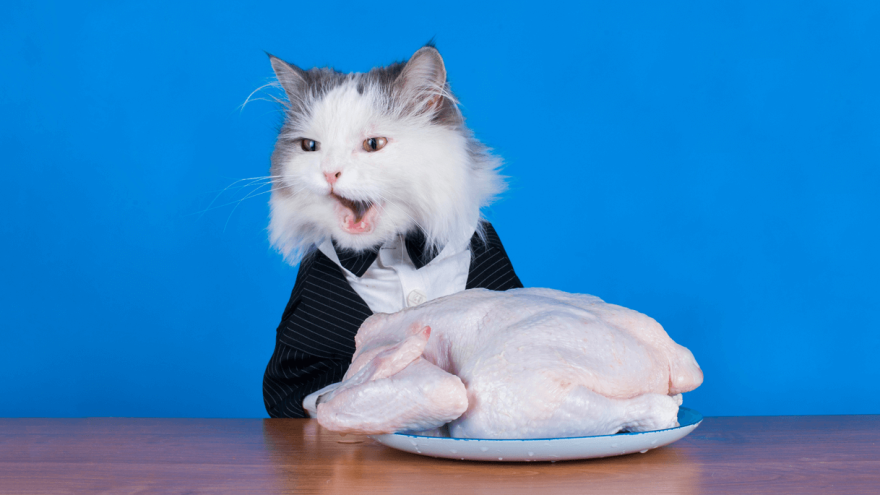

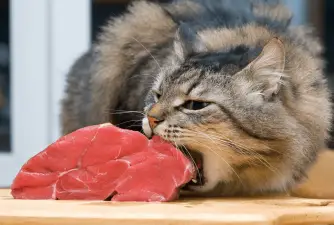



Share